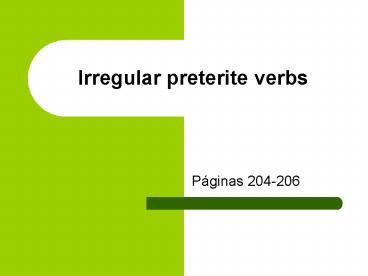Irregular preterite verbs - PowerPoint PPT Presentation
1 / 7
Title:
Irregular preterite verbs
Description:
Ej: Trabaj en Macy's por un d a I worked in Macy's for one day ... What happened? - no s , pero hubo polic as I don't know, but there were police officers ... – PowerPoint PPT presentation
Number of Views:51
Avg rating:3.0/5.0
Title: Irregular preterite verbs
1
Irregular preterite verbs
- Páginas 204-206
2
Irregulars preterite verbs
- Spanish speakers use the preterite tense to
express the beginning and ending/completion of
pas action, condition, and events. - Some Spanish verbs have irregular verb stems in
the preterite - Their endings have no accent marks
3
Irregular preterite
- Dar di diste dio dimos
dieron - Hacer hice hiciste hizo hicimos
hicieron - Decir dije dijiste dijo dijimos
dijieron - Traer trajo trajiste trajo
trajimos trajeron - Ser/ir fui fuiste fue
fuimos fueron
4
poder, saber, querer, venir, estar, tener
- Same ending
- Pud -e
- Sup -iste
- Quis -o
- Vin -imos
- Estuv -ieron
- Tuv
- Ej Trabajé en Macys por un día I worked in
Macys for one day - Fui dependiente I was a salesclerk
- Ej Yo quise comprar un vestido en Macys. Si,
el vestido estubo en especial (sale)
5
Since the preterite tense is used to express the
beginning or the completion of past actions,
conditions, and events, it takes on a especial
meaning with some of the verbs that convey states
or conditions. The preterite form of poder,
saber, querer, and tener que are translated ibto
english as the following (see book page 196)
The preterite of hay is huboEj -Hubo un robo
hoy en esta tienda There was a robbery today in
this store -Qué pasó? What
happened? - no sé, pero hubo policías I dont
know, but there were police officers
6
Actividad en clase
- 205 7-10
- 206 7-13
7
Tarea
- Trabajar en el cuaderno/manual
- Worksheet































